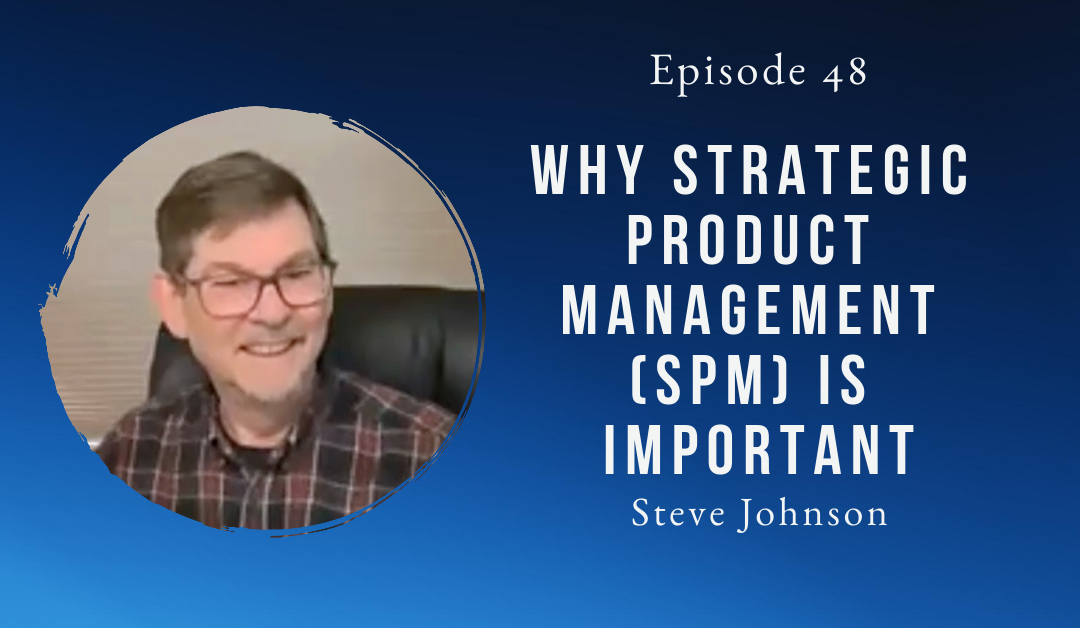Episode 48
Why Strategic Product Management (SPM) is Important.

Product managers often get blamed for failing products. But the truth is, most product failures happen because the product manager didn’t do enough research before making decisions.
In order to make sure your product succeeds, you must first understand the customer. This means understanding what customers really want from your product and why. Once you’ve done that, you can begin designing a solution that will satisfy these needs.
This is where strategic product management comes in. Strategic product management is the art of knowing what the customer wants before you build anything. It’s the difference between building something great and just another mediocre product.
Host
Sannah Vinding
Guest
Episode
E48
Key takeaways



Everybody has a role to play. And unfortunately, product managers seem to be trying to play all positions instead of playing their own.
Steve Johnson

Steve Johnson
Chief Product Office at Product Growth Leaders
Helps to overcome the chaos in managing products. Author, speaker, coach, guitar player. Product Strategy | Product Management | Product Marketing | Product Growth
It’s not so much that we’re looking for major problems or massive needs or anything. We’re really just looking to reduce friction.
Product management is about being strategic. But it doesn’t happen overnight. In fact, most companies spend months, even years, trying to figure out how to build a product strategy. And while there are many ways to approach product management, there are three essential elements that every product manager must master.
#1 – Understand Your Market
In today’s world, understanding your market is critical to succeeding. You don’t want to make decisions based on assumptions, because those decisions could cost you, customers. So, start by asking questions like “Who am I selling my products to?” and “What problems does my product solve?” Once you’ve answered those questions, you can move forward with confidence.
#2 – Focus On One Thing At A Time
A common mistake among product managers is focusing too much attention on one thing at a time. Instead of working on multiple projects simultaneously, focus on just one project at a time. This way, you won’t burn out and you’ll be able to deliver quality work.
#3 – Prioritize Features & Functionality
Once you know who you’re targeting and what problem your product solves, you can begin prioritizing features and functionality. Start by listing down everything you think your product needs. Then, ask yourself why each feature matters and whether it’s worth developing. If it isn’t, cut it off the list.
The most important skillset a product manager should have is ruthlessness. A good product manager knows that he or she needs to focus on the things that matter most, and ignore everything else. There’s always going to be something else that could be improved upon, but sometimes it’s hard to tell what that thing is until you try to improve it. So, ruthlessly prioritize your tasks and only take on projects that really matter. Once you’ve got your priorities set, stick to them. Don’t let yourself get distracted by shiny objects. And remember that you’re not the only one working on your project. Your team members may have ideas that you haven’t thought of yet, and they may be able to help you solve problems faster than you can alone.
Strategic product management is critical to any company’s long-term growth and success. Without it, companies will never have the ability to plan their future effectively. Product managers must understand the entire value chain from conception through launch and beyond. They must also work closely with marketing teams and sales groups to ensure that products meet customer needs and expectations.
Strategic product management requires a deep understanding of customers’ needs, competitors’ strategies, and industry trends. It takes years of training and practice before a product manager becomes truly effective. But once you master the art of strategic product management, you’ll find that it’s well worth the effort.
Related Episodes
How to Turn Industry Trends Into Actionable Supplier Strategies with Heather Fulara, VP at DigiKey – Episode 118
Learn how DigiKey’s Heather Fulara turns trends into supplier strategy, builds trust, and leads with data, curiosity, and clear communication.
How the Shift from Manager to Director Changed My Leadership Style – Joshua Nix Supplier Management Director at Mouser Electronics – Episode 117
Joshua Nix, Director at Mouser Electronics, shares how his leadership style evolved from manager to director—and why mindset, trust, and curiosity matter more than titles.
New Episodes
Bi-Weekly Tuesday







